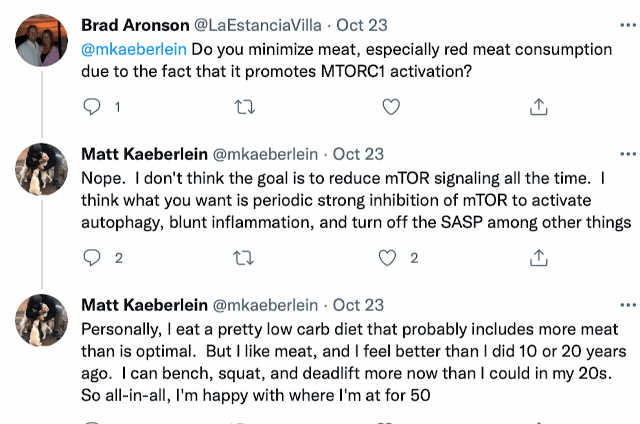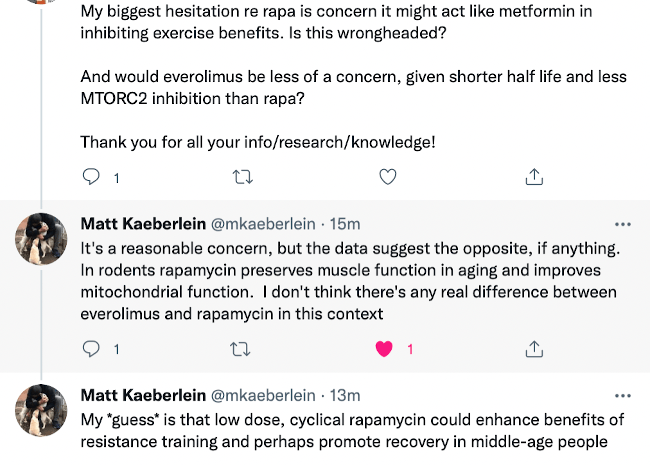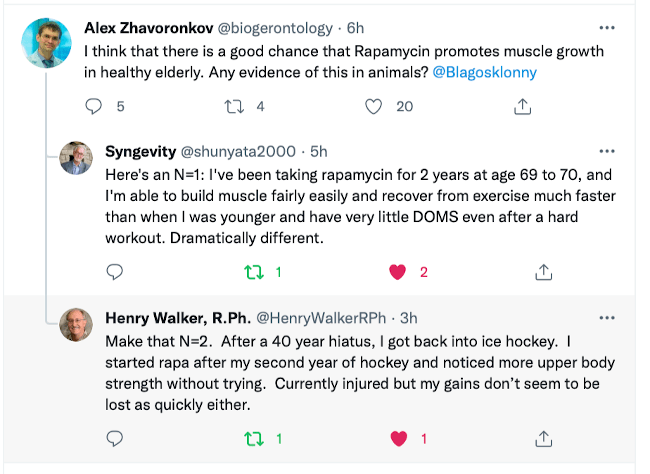Here is a twitter discussion that touches upon the concerns you’ve mentioned:

and, with regard to age related weakening of the muscle (sarcopenia):


Here is a twitter discussion that touches upon the concerns you’ve mentioned:

and, with regard to age related weakening of the muscle (sarcopenia):


Thanks! I follow Matt Kaeberlein on Twitter (and loved both his Peter Attia episodes) but must have missed this one.
Given the periodicity issue, do you think everolimus would be better in this sense than rapa? Due to its shorter half life and lower inhibition of MTORC2?
There seems to be a shortage of everolimus vs sirolimus comparison studies outside the kidney-transplant daily dosing realm. I turned 50 last week and told myself this is the age when I would start, so I’m trying to iron out the last wrinkles in my plan. I really appreciate your advice here!
This is a good question - and everolimus looks very interesting for a number of reasons, not the least of which is the shorter half-life of the drug. But - as you also note, there is very little research on it and given it is now a generic drug, little research will be done on it going forward.
I have not seen any papers that convey it has less inhibition of mTORc2 - but I haven’t researched everolimus that much. Where did you see that?
The issue with everolimus is that while it seems to work identically to rapamycin, there have been no lifespan studies using everolimus, so nobody knows if its as good as, or better, or worse, than rapamycin in terms of lifespan enhancement. But - given its success in the Mannick RAD001 (everolimus) 2014 paper, it seems likely that its very close.
From my own personal experience I think you’re vastly over-thinking this potential issue. Lots of us taking rapamycin are having no problem increasing muscle mass and growth (while also becoming leaner and even losing weight) - so I see no reason to believe that your results will be any different. And - ultimately you won’t know for certain until you try it. Keep your existing work out schedule, track your exercise results, and see what happens. Report back and let us know - but I strongly suspect it will be much better than “fine”.
Also - perhaps of interest:
@AgingHippie is another person who can vouch for increasing muscle strength and mass while on rapamycin. I recently saw (what I believe was him) post this in another forum:
I’ve experienced ZERO effects on my exercise regimen while on Sirolimus and MetforminER.
Yet I continue to see studies like this?
So the question is how many people in this group use Metformin and if yes has it affected your exercise results on any way?
In summary - all the scientific and anecdotal evidence is consistent, and there is not any reason to think this is an issue.
And, for anyone else concerned about this - Matt Kaeberlein, probably the leading expert on the topic weighs in:

More anecdotal evidence on this theme:

Reading:
Full thread on twitter here:
Another video very relevant to the issue of this topic. A new clinical study taking place in the UK focused on use of rapamycin for prevention of muscle aging. Some good information on the science behind why it seems to be working…
I am not sure if the posts in this subreddit r/rapagains account for the content in the recent discussions, but it’s worth checking out.
But as Kaeberlein says above, we’re looking for a periodic strong inhibition of mTOR to activate autophagy/blunt inflammation, etc. Thus, wouldn’t it make sense to avoid nutritional/exercise stimulators of mTOR at least for the couple of days immediately after taking the rapamycin such that mTOR is maximally inhibited during that 2-day window? i.e. for instance, take rapamycin early Sunday morning and avoid protein supplements, insulin spikes and high-intensity exercise for all of Sunday/Monday while rapa levels are highest, then go back to normal diet/exercise on Tuesday. That way I’m maximizing mTOR inhibition 2 days per week. Why counteract the mTOR inhibition (even if only partially) on Sunday/Monday by eating/drinking protein, weight lifting, etc, when I could be doing things that synergize with it such as fasting (or at least partial fasting such as low protein, etc), doing light cardio/yoga instead of weights, etc?
Not sure that I agree about exercise though I agree with fasting.My routine which I am interested in your comments on is to take 6mg Rapamycin in the evening and then the next day have no food other than coffee until at least 1600. During this time I do exercise vigorously for about 2 hours and find that I have very good energy levels and a very good mood.
Interested in comments on this.
We know that vigorous exercise activates mTOR in the muscles (and brain?). What I don’t know is quantitatively how much the exercise is blunting the inhibition from the rapamycin, but it’s reasonable to believe that it is. If it indeed is, then you’d be missing out on some of the long-term benefits of rapamycin for muscle (and brain?), at least compared to if you skipped the vigorous exercise on day1/day2). How you “feel” that day subjectively imo would be irrelevant.
It’s established that there are pathways of muscle building that go around mTOR, so we know we can exercise and still get some benefits of exercise even while mTOR is inhibited (although mTOR inhibition likely blunts short-term muscle hypertrophy at least to some extent). But we want cyclical mTOR inhibition on muscle tissue. We don’t want to just inhibit it everywhere else and skip muscle. mTOR inhibition in muscle tissue helps reverse senescence, increases autophagy, and appears to help build muscle (or at least prevent muscle loss) in the long run. Therefore, it would seem counter-productive in the long run to engage in high-intensity exercise in the immediate post-rapa-ingestion period while mTOR inhibition is maximally inhibited. It would be like eating a Twinky while fasting (although hopefully not as dramatic an effect).
I’m hoping Blagovskonny will address the above topic. He’s teased it on his web site, but so far I haven’t seen anything specific from him on this.
Excellent point. I’ve noticed an extended period of muscle soreness from intense workouts done in the first few days after weekly rapa dose compared to identical workouts done later in the cycle or during a wash down. I was wondering if I was wasting effort to be working out when rapa level is high. I hadnt considered that I also might be blunting the effect of mTOR1 inhibition. Yes, I hope that Blagoskonny will address this issue.
It really could go either way. I do one 72 hour fast per month. The rest of the month, my exercise is all Brazilian jiu jitsu plus supplemental cardio, but during my fast I add in weights (squats, deadlifts) to preserve muscle mass through the fast. Peter Attia is pretty adamant about doing this through his fasts–there may be a parallel for rapamycin?
I’m still waiting for my order to arrive from India. Once it does and I start, I’ll report back. I measure everything every morning (RHR, HRV, blood glucose, lactate, etc.). HRV especially may show how how the rapamycin is impacting recovery.
I just think it’s important to keep in mind that we’re talking about 2 separate (albeit related) things here. 1) the effect of rapamycin on muscle growth/recovery from intense exercise, and 2) the effect of exercise on the long-term muscular benefits of rapamycin
Topic #1 would be the acute effect of rapamycin on dampening mTOR and acutely inhibiting protein synthesis after high intensity exercise. We know from at least one recent study that there are some redundant pathways for muscle protein synthesis, such that we can still get some hypertrophy even in the presence of rapa, albeit less.
Topic #2 (and the most important by far, IMO) would be the possible blunting of mTOR suppression by high-intensity exercise during the 2+ day window of maximal mTOR suppression by rapa, repeated week after week x months/years. The blunted mTOR suppression could partially negate increased autophagy, stem cell rejuvenation, etc etc.
Even if mTOR suppression by rapa can’t be directly blunted by exercise (or insulin spikes, etc), might not some of those same redundant non-mTOR-dependent protein synthesis pathways blunt the otherwise-beneficial effect of the rapamycin? It still seems, at least intuitively, that we’re wishfully thinking we can have our cake and eat it too by training intensely during maximal mTOR suppression periods, but I hope I’m wrong!
Ok, this researcher and I seem to be on the same page. He’s designed a study where he wants to give rapa 5mg once weekly to older adults and have them exercise, seemingly on the days when mTOR is not maximally inhibited (although he doesn’t specifically give the weekly timeline), to see if this regimen increase muscle size/performance over and above placebo+exercise. He explains the rational very well in the included video.
I plan to start rapa this weekend and I’m still thinking about the optimal scheduling, particularly in light of your Topic #2.
Sundays are usually my rest day. I was thinking of taking the rapamycin directly after my noon BJJ class on Saturday, but it looks like the exercise activation of mTOR lasts at least 24 h post-exercise. So maybe I take the rapamycin Sunday morning early, which gives me until Monday evening with no exercise. Maybe I’ll throw in fasting on Sundays to help.
Between 24+ hours for exercise-induced mTOR activation and a 2-day window of maximal inhibition from the rapamycin, there’s no way to make a weekly dose work perfectly. I’m going to start weekly, but am increasingly interested in how those of you who are doing larger doses every 2 weeks feel that approach is working.
Relevant to this discussion on rapamycin and muscle growth are these comments here:
and
I have had positive muscle-building results.
My results:
Under possible placebo effects:
I feel much more energized and complete more tasks, less procrastination.
Results I didn’t expect, therefor much less likely they are placebo effects:
One: The biggest surprise which I didn’t notice at first, probably because it was a gradual cure.
I am 80+ years old and had developed age-related "essential tremors’’ in my hands. I wouldn’t be able to eat peas on a fork and get them to my mouth. In fact I was starting to get embarrassed when eating with company. Then a couple of weeks ago I was eating and said in my mind; WTF!, my hands are not shaking anymore, in fact they are as steady as they have ever been!
Second: I go to the gym 3-6 times a week. I had "plateaued’’ on the max weights and sets I could do. I must mention that I have been taking care of myself and taking a lot of supplements, including NMN, metformin, etc. I have never suffered from sarcopenia.
Now I have passed the plateau and have increased my max weights and increased my sets from 3 to 5. People probably are skeptical, but I have never been stronger.
To those that are younger: You probably won’t notice much, because you are not broken and probably don’t need fixing.
My blood tests are very good with a slight decrease in white blood cell count, down from 9.1 to 7.9. still within normal range. After a 6 week wash-out period, I will test again before I start a second 100 mg total dose at 10 mg every 14 days. This may tell me about the effect on my white blood cell count. I didn’t notice any effect on other blood tests, as they are already good.
And again, under possible placebo effect, I have never felt better.
I’ve now been on rapamycin for 6 weeks, not counting one week where I skipped my dose because I had omicron. I’ve maintained a consistent schedule. My last training session of the week is 12 to 2 on Saturday. I take my rapamycin Sunday morning first thing. My next training session is Monday at 6PM. My training is Brazilian Jiu Jitsu, and while I do supplemental strength and cardio, I don’t do it during that rapamycin window.
My take-away so far is purely subjective–no biomarkers–but I’ve been doing BJJ for 13 years, 6 days a week. I’m a 50-year old black belt with asthma, rolling with 25 year old lower belts, so I have what I think is a good sense of my energy expenditure. Sundays have been my rest day for the last five years.
Pre-rapamycin: Those Monday evening classes tended to be ones where I had the most energy. Then I’d gradually get worn out over the course of the week, etc. The end of the week was usually at a far lower energy level.
With rapamycin: Mondays are noticeably low energy. This may be compounded by fasting on Sundays. I do eat a late lunch Mondays to refuel, but I nevertheless feel fatigue much sooner during the Monday training. On the flip side, however, I seem to have a much better recovery capacity at the end of the week.
I’m still somewhat undecided on the optimal timing of the rapamycin given my schedule: whether to eat it Sunday morning, or Saturday night. Mikhail Blagosklonny offered me a partial answer in a tweet, which I took as “don’t overthink it.”